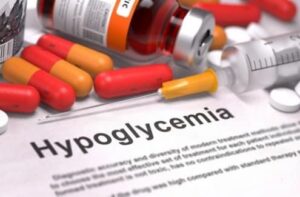Postprandial hypoglycemia, commonly referred to as reactive hypoglycemia, is a condition characterized by abnormally low blood glucose levels following meals. However, understanding the underlying causes and adopting a comprehensive management strategy can significantly improve one’s quality of life. This guide aims to discuss postprandial hypoglycemia treatment advice on managing it effectively.
Contents
What Is Postprandial Hypoglycemia?
 Postprandial hypoglycemia is a condition characterized by an abnormally low level of glucose (sugar) in the blood after eating. Typically occurring within four hours following a meal, it contrasts with fasting hypoglycemia, which happens when the stomach is empty. The condition stems from an exaggerated insulin response to food intake. It leads to a more rapid depletion of glucose than normal, resulting in symptoms of hypoglycemia.
Postprandial hypoglycemia is a condition characterized by an abnormally low level of glucose (sugar) in the blood after eating. Typically occurring within four hours following a meal, it contrasts with fasting hypoglycemia, which happens when the stomach is empty. The condition stems from an exaggerated insulin response to food intake. It leads to a more rapid depletion of glucose than normal, resulting in symptoms of hypoglycemia.
This response can be due to various factors, including gastric surgery, certain metabolic disorders, or hormonal deficiencies, though sometimes, the precise cause remains unidentified. Understanding postprandial hypoglycemia requires recognizing its primary hallmark: the significant drop in blood sugar levels following meal consumption, despite the presence of food that should ostensibly raise or stabilize glucose levels. This drop triggers a range of symptoms, from mild to severe, including dizziness, sweating, confusion, and even loss of consciousness in extreme cases.
Why Is Blood Sugar Low After Eating?
Blood sugar levels dropping after eating, a condition known as postprandial or reactive hypoglycemia, seems counterintuitive since eating typically leads to a rise in blood sugar levels. Here are several factors that can contribute to this abnormal response:
- Excessive Insulin Release
After eating, especially a meal high in simple carbohydrates, the body may release more insulin than needed. Insulin is the hormone responsible for lowering blood sugar by facilitating the uptake of glucose by cells. An overproduction can result in blood sugar levels falling too low.
- Delayed Stomach Emptying (Gastroparesis)
In some cases, the stomach empties slowly, causing a delayed but prolonged absorption of glucose into the bloodstream. The body may initially respond by releasing too much insulin when the glucose eventually enters the bloodstream, leading to hypoglycemia.
- Insulin Sensitivity or Pancreatic Beta Cell Dysfunction
Some individuals have a higher sensitivity to insulin or a dysfunction in the pancreatic beta cells (which produce insulin). This can cause an overreaction to the presence of glucose in the blood. And, leading to excessive insulin release.
- Previous Gastric Surgery
People who have undergone certain types of gastric surgery, such as bariatric surgery for weight loss, may experience postprandial hypoglycemia. Changes in the anatomy of the stomach and intestines can affect how food is absorbed and how insulin is released.
- Hormonal Deficiencies
Rarely, deficiencies in hormones that counteract the action of insulin, such as glucagon, cortisol, epinephrine, or growth hormone, can lead to hypoglycemia after eating.
- Dietary Factors
Consuming a meal high in simple sugars can lead to a rapid spike in blood sugar followed by a swift decline, particularly if the body overshoots its insulin response. Conversely, a meal with a balanced amount of complex carbohydrates, protein, and fats is less likely to cause such a rapid decline.
Understanding the underlying cause of postprandial hypoglycemia is crucial for determining the most effective treatment or management strategy.
What Is The Drug Of Choice For Postprandial Hypoglycemia?
 Postprandial hypoglycemia treatment (reactive hypoglycemia) primarily focuses on dietary and lifestyle modifications rather than medication. Since the condition is often a result of an excessive insulin release following meals, the initial approach includes adjusting meal composition and frequency to prevent these sharp declines in blood glucose levels.
Postprandial hypoglycemia treatment (reactive hypoglycemia) primarily focuses on dietary and lifestyle modifications rather than medication. Since the condition is often a result of an excessive insulin release following meals, the initial approach includes adjusting meal composition and frequency to prevent these sharp declines in blood glucose levels.
However, in cases where these measures are insufficient and the hypoglycemia is severe or due to specific underlying causes, medication may be considered. There isn’t a universally accepted “drug of choice” for postprandial hypoglycemia because the treatment largely depends on the individual’s specific circumstances. In some cases, doctors might prescribe medications that slow carbohydrate absorption or modify insulin secretion.
For example, acarbose, an alpha-glucosidase inhibitor that slows the breakdown and absorption of carbohydrates in the intestine, may be used in certain situations to help manage blood sugar levels after meals. It’s crucial for individuals experiencing symptoms of postprandial hypoglycemia to consult with a healthcare provider for a thorough evaluation and personalized treatment plan.
What Are The Best Postprandial Hypoglycemia Treatment?
The best postprandial hypoglycemia treatment focuses on non-pharmacological strategies to stabilize blood sugar levels and prevent the significant drops that occur after eating. Here’s an overview of the most effective strategies:
Dietary Adjustments
- Small, Frequent Meals: Eating smaller meals more frequently can help maintain a stable blood sugar level by preventing the large spikes and drops that can occur with larger, less frequent meals.
- Balanced Diet: Focus on a balanced diet rich in fiber, lean proteins, and healthy fats. This combination helps slow the absorption of carbohydrates, leading to a more gradual rise in blood sugar levels.
- Low Glycemic Index Foods: Incorporate foods with a low glycemic index (GI) that raise blood sugar levels more slowly and steadily. Examples include whole grains, legumes, nuts, seeds, fruits, and non-starchy vegetables.
- Limit Simple Sugars: Reduce the intake of foods and drinks high in simple sugars, such as sodas, candies, and desserts, which can cause rapid spikes in blood sugar.
- Consistent Carbohydrate Intake: Try to keep your carbohydrate intake consistent across meals to help manage blood sugar levels.
Lifestyle Modifications
- Regular Physical Activity: Engage in regular, moderate physical activity. Exercise can increase insulin sensitivity, helping your body to better manage blood sugar. However, monitor blood sugar levels to prevent hypoglycemia, especially after intense or prolonged physical activity.
- Monitor Blood Sugar Levels: Keeping track of your blood sugar levels before and after meals can help you understand how different foods and activities affect you, enabling more tailored adjustments to your diet and lifestyle.
- Adequate Sleep: Ensure you get enough quality sleep. Poor sleep can affect blood sugar control and insulin sensitivity.
- Stress Management: Stress can impact blood sugar levels. Techniques such as meditation, yoga, deep breathing exercises, or other relaxation methods can help manage stress effectively.
Education and Planning
- Educate Yourself: Understanding your condition and how different factors affect your blood sugar can empower you to make informed decisions about your health.
- Meal Planning: Plan your meals to ensure they are balanced and to avoid the temptation of less healthy, convenience foods.
- Professional Guidance: Consider consulting with a dietitian or a nutritionist who can help you create a personalized eating plan that meets your nutritional needs and helps manage your condition.
By implementing these strategies, many individuals with postprandial hypoglycemia can effectively manage their condition and reduce the occurrence of symptoms. Remember, what works best can vary from person to person. So it may be necessary to experiment with different approaches to find what works best for you.
What Is The Best Immediate Treatment For Postprandial Hypoglycemia?
 The immediate treatment for an episode of postprandial hypoglycemia focuses on quickly raising your blood sugar to a normal level. Here is the best immediate action to take:
The immediate treatment for an episode of postprandial hypoglycemia focuses on quickly raising your blood sugar to a normal level. Here is the best immediate action to take:
1. Consume Fast-Acting Carbohydrates
Ingest 15-20 grams of fast-acting carbohydrates. These are sugars or carbohydrates that are quickly absorbed by your body, raising blood sugar levels swiftly. Examples include:
- Glucose tablets or gels (follow package instructions for the correct dosage).
- 4 ounces (about 1/2 cup) of regular (not diet) soda.
- 4 ounces of fruit juice.
- A tablespoon of honey or sugar.
- Hard candies (check the package to determine how many to consume to equal 15-20 grams of carbohydrates).
2. Recheck Your Blood Sugar
After consuming the fast-acting carbohydrates, wait about 15 minutes and then check your blood sugar level again. If your blood sugar remains low (below 70 mg/dL or your target range), consume another serving of fast-acting carbohydrates.
3. Follow with a Snack or Meal
Once your blood sugar level is back within your target range, if it’s going to be an hour or longer before your next meal, eat a small snack. This could be something that includes complex carbohydrates and protein, such as a piece of fruit with a handful of nuts or a slice of whole-grain bread with peanut butter. This helps stabilize your blood sugar and prevents another drop.
Immediate treatment for hypoglycemia is crucial to prevent the symptoms from worsening, which can lead to confusion, loss of consciousness, or seizures. If you frequently experience episodes of postprandial hypoglycemia, it’s essential to see a healthcare provider. They can help identify the underlying cause of your hypoglycemia and recommend long-term management strategies to prevent future episodes.
Conclusion
In conclusion, postprandial hypoglycemia treatment involves a holistic approach that includes dietary changes, lifestyle adjustments, and, in some cases, medical intervention. Individuals can significantly reduce the symptoms associated with this condition by focusing on eating small, balanced meals throughout the day, incorporating low glycemic index foods, and engaging in regular physical activity. Monitoring blood sugar levels and consulting healthcare professionals for personalized advice is crucial.
With the right strategies, those affected by postprandial hypoglycemia can lead a healthy and active life, minimizing the impact of this condition on their daily activities. Do you want to get rid of diabetes? Join our online diabetes treatment program and reverse Diabetes naturally through lifestyle changes such as a Personalized Diet plan, Exercise, Yoga, dieticians, and health coaches.

